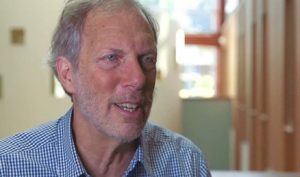Herman Korff
 Nee, wij mochten thuis niet ‘mof’ zeggen en geen flauwe grappen maken over radio’s en fietsen die teruggebracht moesten worden. Er waren ook goede Duitsers legde mijn vader uit.
Nee, wij mochten thuis niet ‘mof’ zeggen en geen flauwe grappen maken over radio’s en fietsen die teruggebracht moesten worden. Er waren ook goede Duitsers legde mijn vader uit.
In de zomer van 1944 werd mijn opa, Pake Auke, aangesproken toen hij zijn koeien zat te melken op het stukje land vlak buiten Giekerk.
De man vroeg of hij wat melk kon krijgen.
Daarna kwam de man iedere dag langs.
Dat bezoekje duurde steeds langer. Beiden vermeden de oorlog als onderwerp.
Pake vermoedde dat het een onderduiker was die in het bootje van Eeuwe de Vries sliep. Vlakbij de eendenkooi bij de Giekerkerhoek.
Aan het accent te horen dacht Pake dat het een Limburger was.
In de herfst gingen de koeien op stal en zagen de twee elkaar een paar weken niet.
Tot verbazing van Pake stond de man op een dag in de schuur van de boerderij. Hij vroeg of hij een nacht in het hooi mocht slapen met het oog op de naderende regen en storm.
De volgende ochtend vroeg hij of het misschien mogelijk was om er vaker te slapen nu het kouder werd. Pake Auke wilde nu eerst weten wie de man was.
Herman Korff. Een Duitse communist. En dienstweigeraar. Hij was al vier jaar op de vlucht. Eerst had hij onderdak gevonden in Groningen en later in Leeuwarden. Vanuit die stad was hij naar dat bootje bij de eendenkooi gebracht.
Na overleg met mijn oma kreeg hij te horen dat hij de koude dagen door kon brengen in de schuur van de boerderij.
Korff waarschuwde: ‘Als ze me vinden, krijg ik de kogel. Maar jullie ook.’
Dat hadden Pake en Beppe wel begrepen.
Herman Korff had onderdak voor de winterse dagen.
Na de oorlog bleef het contact met Korff bestaan. Ook al omdat mijn vader de laatste maanden van de oorlog onder mocht duiken. Na een mislukt wapentransport waarbij twee doden vielen, moest mijn vader zich schuilhouden. Ook hij verbleef in dat scheepje bij die eendenkooi en in die hooischuur bij wat later zijn schoonouders werden. Want ook in oorlogstijd bloeit de liefde.
Na de oorlog kwam oom Herman zo nu en dan op bezoek, soms gingen mijn ouders naar het stadje in het Ruhrgebied waar Herman Korff in 1991 op 81-jarige leeftijd overleed.
The Embassy Of Good Science
 The goal of The Embassy of Good Science is to promote research integrity among all those involved in research. The platform is open to anyone willing to learn or support others in fostering understanding and awareness around Good Science.
The goal of The Embassy of Good Science is to promote research integrity among all those involved in research. The platform is open to anyone willing to learn or support others in fostering understanding and awareness around Good Science.
The Embassy aims to become a unique ‘go to’ place, a public square where the community of researchers can gather to discuss ‘hot topics’, share knowledge, and find guidance and support to perform science responsibly and with integrity.
We want to focus on researchers’ daily practice. Our ambition is to collaboratively map the laws, policies and guidelines informing good practices and highlight relevant cases, experiences, educational materials and good practice examples. We will also support educators to develop training on research integrity and ethics.
Let our community take over
The Embassy of Good Science is developed by and for researchers, who are willing to gather and join forces to preserve and safeguard good science. No embassy can function without its ambassadors. And that’s where you come in.
The Embassy of Good Science
Your platform for research integrity and ethics
Our declaration describes the Embassy’s principles in strong, affirmative language. It forms a clear reference for all involved, including you.
Go to: https://www.embassy.science/
If Democrats Can’t Win The Economic Debate, Trump Will Win In 2020
Pundits and economic models predict that if nothing changes in the next two years on the economic front, Donald Trump will be re-elected in 2020 by a bigger margin than in 2016. To be sure, the economy is usually the top priority for voters heading into a presidential election, and the U.S. economy appears on paper to be doing well since Trump moved into the White House. According to the Bureau of Economic Analysis, real gross domestic product (GDP) increased at an annual rate of 3.2 percent in the first quarter of 2019 (real GDP grew by 2.2 percent in the fourth quarter of 2018), and the national unemployment rate is at a low 3.8 percent, with applications for unemployment benefits having declined to a 49-year low.
Nonetheless, while the economy looks strong, the economic condition of most Americans is anything but rosy. And, according to a Federal Reserve’s “Report on the Economic Well-Being of U.S. Households in 2018,” roughly 40 percent of households would not be able to cover a $400 “unexpected expense.”
At the same time, the majority of Americans think that the economic system benefits mostly the wealthy, and want to see the government do something about this situation.
As such, the question is whether Democratic presidential candidates have the vision and the boldness to put structural economic reforms on top of their pre-election campaign. Bernie Sanders and Elizabeth Warren have already positioned themselves as the ideas candidates for fixing the economy, although Wall Street Democrats will clearly oppose both of them. In the absence of a plan to abolish capitalism, drastic reforms to make it more equitable are a necessary precondition for the economic well-being of the majority of people in the U.S. — reforms that would likely prove to be detrimental to the economic interests of the super-rich, who are intent on accumulating ever higher amounts of wealth. Yet, it is unclear what sort of reforms deserve top priority in today’s U.S. economy. To answer that question, we interviewed Robert Pollin, distinguished professor of economics and co-director of the Political Economy Research Institute at the University of Massachusetts-Amherst.
C.J. Polychroniou: Bob, the U.S. economy is said to be booming, although Democrats attribute this fact to the policies of the Obama administration. Firstly, is the U.S. economy in such a good shape as it appears to be on paper? Secondly, for how long can the Democrats go on giving credit to Obama for today’s signs of a strong economy?
Robert Pollin: First of all, based on the most standard measure of overall economic performance, the growth rate of Gross Domestic Product (GDP), the U.S. economy has not been booming under Trump. Indeed, over the two full years under Trump, 2017-18, real economic growth (adjusted for inflation) averaged 2.5 percent per year. This is no better than the average for the full eight years since the Great Recession officially ended in 2010. Over the 57-year period prior to the 2008 Great Recession (1950-2007), U.S. real economic growth averaged 3.4 percent per year. The Trump economy obviously hasn’t come close to reaching this long-term average growth trend.
It is true that the official unemployment rate is at a historic low, at 3.8 percent of the labor force. However, let’s also consider a broader official measure of unemployment coming from the U.S. Labor Department, one which includes both the “underemployed” — i.e., people in part-time positions but seeking full-time work — as well as people who have become discouraged from looking for a job due to lack of success. By this measure, the unemployment rate rises to 7.3 percent. If we also add in the roughly 5 million people who have dropped out of the labor market following the Great Recession, that would bring the unemployment rate to 10.3 percent. So while labor market conditions are indeed far better now than they were 10 years ago, as we were just coming out of the Great Recession, there is still a lot of distress among people trying to get jobs, much less good jobs.
The Obama administration, along with the Federal Reserve, does deserve credit for helping to avoid a total financial collapse in 2008 that could have led to a Depression as severe as the 1930s. Who knows where we would be today if, a decade ago, the unemployment rate had risen to, say 25 percent, as it did in the 1930s, versus 10 percent during the Great Recession.
4 en 5 mei
 Als om half acht de Wester Harmonie zich opstelt om de herdenking bij het monument van Gerarda Rueter aan de Egidiusstraat in Bos en Lommer muzikaal te omlijsten, schijnt de zon, komen steeds meer bezoekers aanwandelen, gaat een herdershond languit op de stoep liggen.
Als om half acht de Wester Harmonie zich opstelt om de herdenking bij het monument van Gerarda Rueter aan de Egidiusstraat in Bos en Lommer muzikaal te omlijsten, schijnt de zon, komen steeds meer bezoekers aanwandelen, gaat een herdershond languit op de stoep liggen.
Een meneer met een snor spreekt vriendelijke welkomstwoorden, een meisje zingt een lied in het Arabisch, gedichten worden voorgedragen, een mevrouw vertelt over al die doden.
Na de Last Post is het stil.
Twee minuten lang.
De Wester Harmonie zet het Wilhelmus in, een paar bezoekers zingen zachtjes mee, kransen worden gelegd, witte rozen uitgedeeld, de Harmonie speelt wat nummers nog maar een keer, op zo veel tijd is niet gerekend.
Als we naar huis lopen, laat een junk een fles wijn vallen, net gekocht, zijn bondgenoot ontploft, er wordt gevloekt, geschreeuwd. Dit is niet de dag voor trammelant, ik geef vijf euro, anders heb ik niet, dankbaarheid is mijn deel.
Vanochtend langs tante van 83 die meldt dat voor haar 4 mei er niet zo toe doet, met het ouder worden denkt ze steeds vaker, iedere dag, aan de dag dat ze op bezoek zou gaan bij opa en oma, die 20 minuten eerder waren opgehaald om nooit terug te komen. Dat ze steeds vaker, iedere dag, denkt aan haar moeder die zo wit was en zo bang. Dat ze vanaf haar achtste nooit meer kind geweest is, dat ze blij is om verder in vrijheid te hebben mogen leven.
- Page 4 of 4
- previous page
- 1
- 2
- 3
- 4



